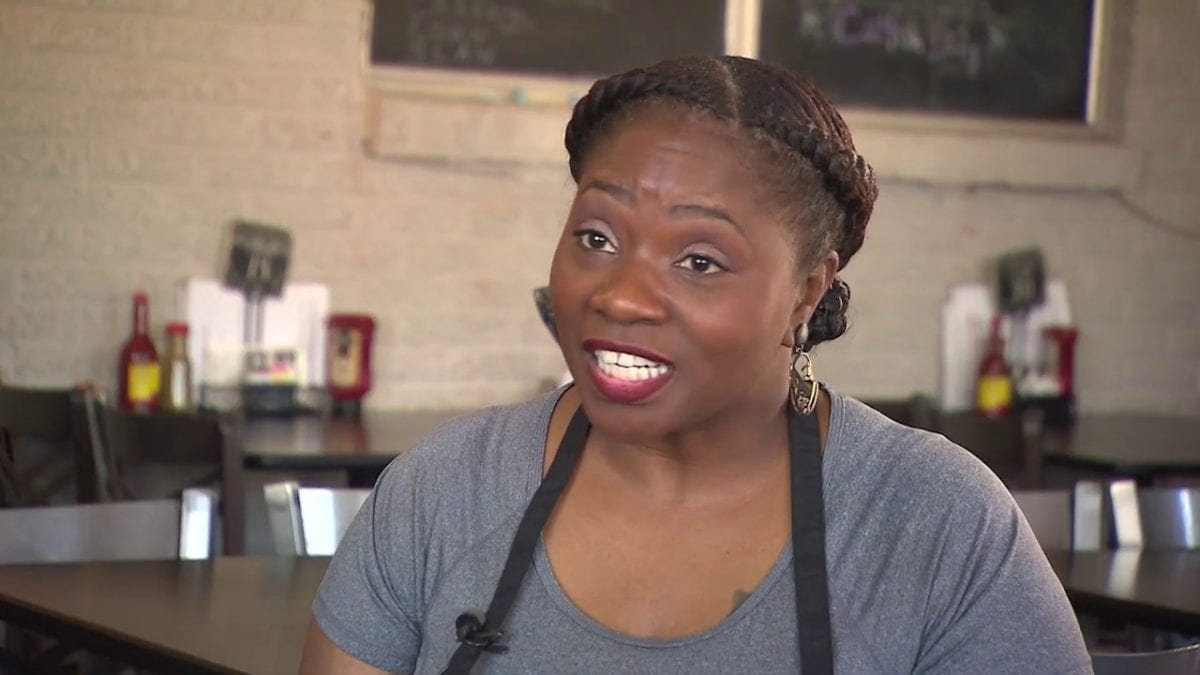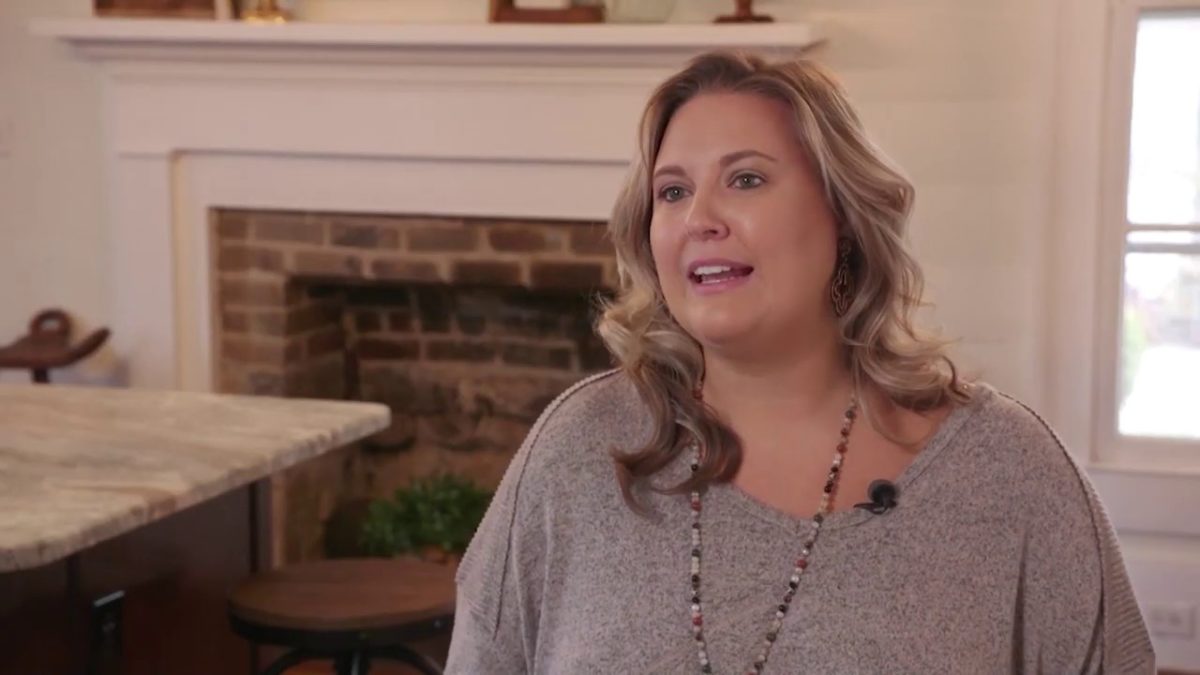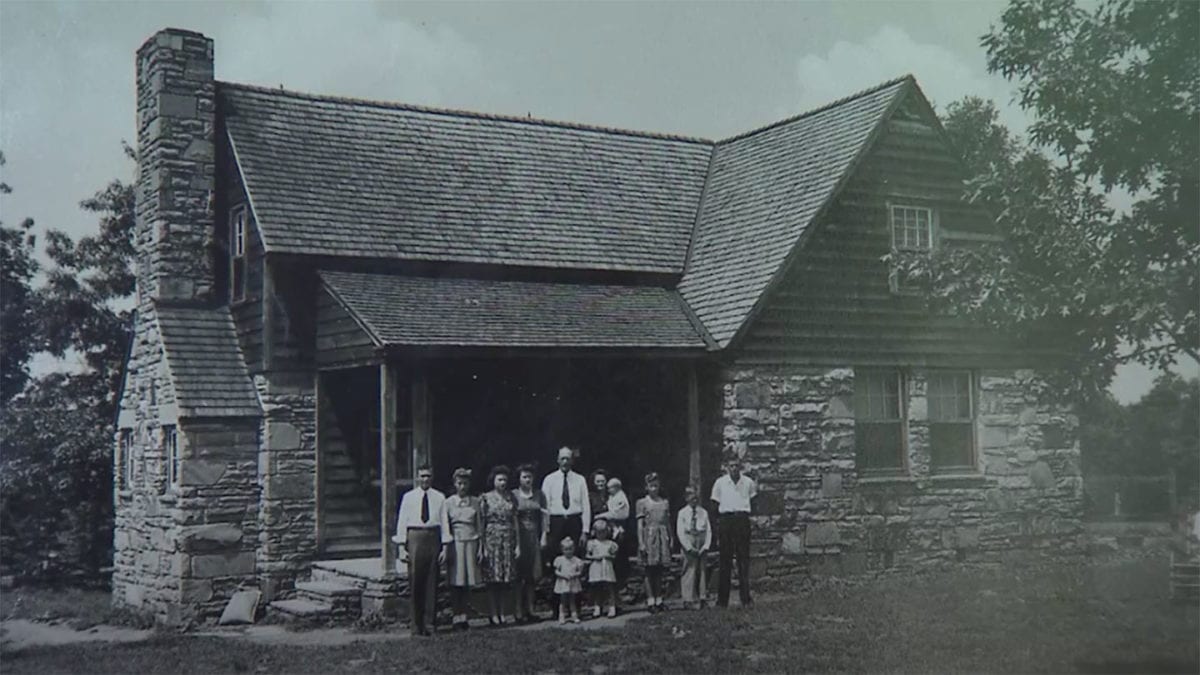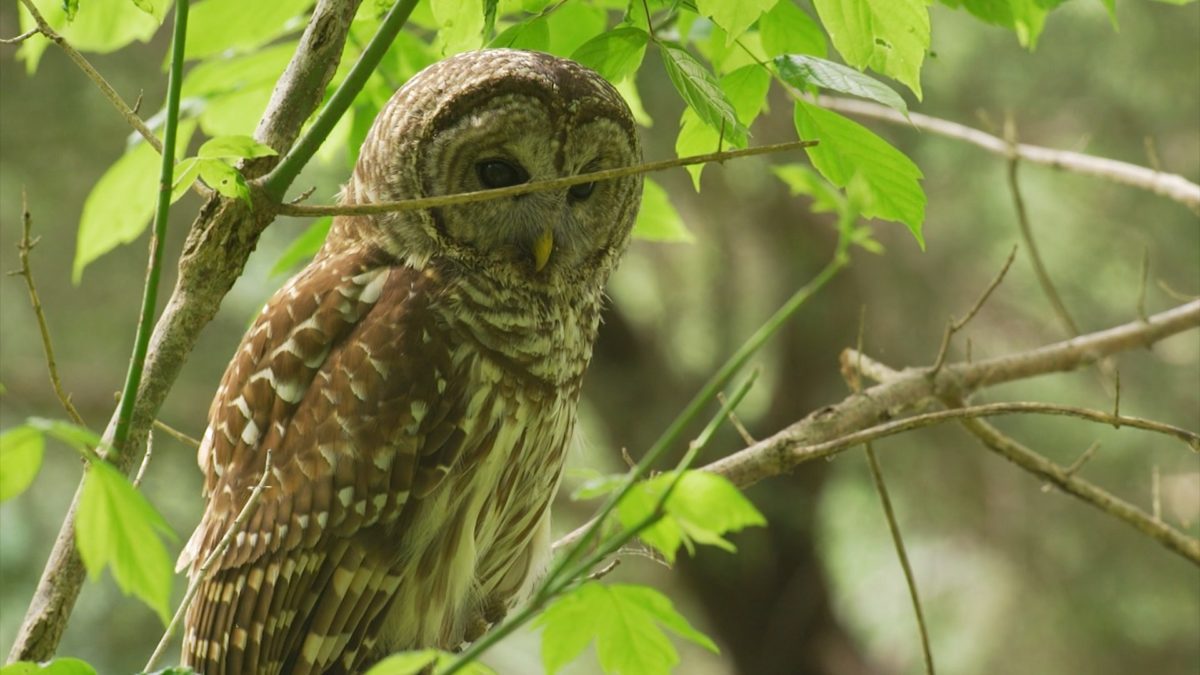Episode 3331
Don't have the PBS App? Click Here
Episode Transcript
- [Joe Elmore] This time on "Tennessee Crossroads" we pay a visit to a popular family owned meat and three in Goodlettsville. Then tour Promise Manor in Lynchburg. We'll pay a visit to a pair of museums in Crossville, and do a little bird watching at Radnor Lake in Nashville. Hi everybody, I'm Joe Elmore, welcome once again to another "Tennessee Crossroads". I guess it's no secret that the meat and three dining concept was born in Tennessee. Nashville, to be exact. But you know the surrounding towns have their own meat and three destinations too. Well, like Liz's Kitchen in Goodlettsville. It's well known to townspeople for it's fresh, flavorful food, family atmosphere, and affordable prices. A well kept secret? Well, not anymore. - Woo. Here you go baby. Thank you George. Friendly, lovin', and full of laughter. And great food! Hi Mr. Royce! - [Joe Elmore] That, in a nutshell, is how regular customers describe Liz's Kitchen. - [Veronica] Enjoy. - [Joe Elmore] Just off Main Street in Goodlettsville. After opening in 2010, this place quickly became a breakfast and lunch destination for hungry locals. Part of the secret is owner Liz Darden, herself. Her cooking talents have been well known in this community for decades. - [Liz] See, everybody knows me, 'cause I have cooked for just about everybody in Goodlettsville anyway. I do a lot of catering, and when I worked at the First Baptist Church, see, I done all the Sunday school, parties, Christmas parties, and all that stuff. Birthday, weddings, all that stuff. So, they really support me. - [Joe Elmore] Liz's Kitchen is also a family business. - It's almost party time, pop. - [Joe Elmore] Which makes for a fun, and effective operation. Bubba Darden is the main chef and mastermind of everything, from hearty breakfast dishes, to their now legendary lunches. - He think he learned on his own, but he really learned from me. I'm the griller, really. - She the boss! - He thinks he's the boss, but I'm really the boss. - [Joe Elmore] Now, Bubba's more a man of action than words, unlike Liz and daughter Veronica. - I told him that I sing to you every day when you come in. It's a blessing to be able to be here, my mom and dad are still here. They do all the cookin' themselves, they're very bossy and demanding. - He told you not to sing. - [Veronica] I know, right? But it's a blessing, to be working with them. There you are! You're welcome! - [Joe Elmore] The family is also blessed with a legion of loyal customers. Most of which, they know by name. - We have customers that come morning and lunch, and then on Fridays we have customers that come morning, lunch, and dinner. - Now, the specials change daily. Today, well, barbecue ribs, and Bubba's special recipe for catfish. Some of the best in the mid south. - [Bubba] Well, we make a home batter, and season it up I guess. I guess, try to make it taste good. - [Joe Elmore] By 10:30, the lunchtime serving line is loaded with fresh, seasoned vegetables, along with today's meat specials. Which today, also includes hamburger steak. Now, you can order from a regular menu, but most folks go straight to the serving line for their food and free serving of friendliness. - Enjoy! - [Man] Thank you! - You're welcome, baby. Our customers, comin' in, and they're so kind and so pleasant, it gives us strength to keep going on. Okay baby, enjoy! Mr. Lewis is 90-something years old, 97, and he comes here every day. - [Joe Elmore] Really? - Yes. - [Elderly Man] Once I get in here, I'm okay. - [Liz] All right, that's what we like to hear! - [Joe Elmore] By noon, the place is humming with hungry customers. While the kitchen staff hustles to replenish supplies of fresh baked cornbread, fish filets fried to perfection, of course, and hush puppies. Oh, there's another family member at work in the kitchen. Del is the Darden's grandson, and quite the chef himself. - [Veronica] And he's here every day with us. He's uh, if you ask my father, who is the cook, he would probably put him, he's the second man in charge. Yeah. They don't give us women credit. - [Joe Elmore] Speaking of employees, most of them have worked for Liz for many years. Which says a lot about the workplace, and it's owners. - [Liz] Well, they say they love me. And, you know, and I'm good to 'em, and they good to me, and they love Bubba. - No bread, right baby? - [Man] No ma'am. - [Joe Elmore] The Darden's have a well earned reputation for their friendly service. - You want me to sing some more? - [Joe Elmore] Generous portions, and their passion for creating consistently good food. As Liz calls it, food for the soul. - [Liz] Now when they leave here, they say they need a nap. We don't let 'em leave hungry, that's one thing we don't do. We make sure they get plenty, and get their money's worth. Yup. - If you come in, want somethin' to eat, ain't got no money, We will feed anybody. - Oh yeah, no, we ain't gonna turn nobody down. - [Veronica] Hey honey, how are you? - All too often, historic homes are bulldozed in the name of progress. Or just left to wither away. Cindy Carter met a young family in Lynchburg that has repurposed an antebellum mansion as a wedding and event venue. Now, the old home helps celebrate the joining of new lives, at a place aptly named Promise Manor. - [Cindy Carter] For decades, people in Lynchburg, Tennessee drove by this old home on Motlow Barn road every day. But paid little attention to it. Though they saw it often, they just didn't really see it anymore. Owner Kayla White admits she rarely gave the old place a second glance. - I grew up here, I've passed this house a million times, but I had no idea that it was still here, or even the history. - [Cindy Carter] Now, Kayla and her husband Dennis think about the house and grounds every single day. The couple bought the old Green-Evans-Hudgens home in 2018, renovated it, and turned it into a wedding and event space that celebrates promises. The ones made between couples, between friends, between families. - I wanted to create an experience for our guests. A lot of people are craving being able to be in a home that feels like grandma's, it creates the sense of peace and calm. So my whole thing was, I went to my husband and I said, "how can we create a place that actually gives people an experience?" - [Cindy Carter] The place is now called Promise Manor. A space that provides a home for events, like baby showers, weddings, engagements, and other celebrations. And Kayla and Dennis say they had no idea how full of promise this place actually was when they decided to take a risk. - My husband and I had started kind of a spiritual journey into figuring out what God had planned for our lives. And we knew, we knew that whatever the plan was, it was gonna be great, and we knew that was a promise from God. We always say that our first child is our first promise, and once we had purchased this place, we knew it was our second promise. - [Cindy Carter] Kayla says she always had a passion for event planning, and she and Dennis decided to follow that passion straight to a very crowded local auction. - I was like there's no way. There's too many people here. - [Cindy Carter] But when the time came, Kayla excitedly raised her paddle and heard the word that changed her life. Sold. - Auction started, and we raised our paddle, and we were the only one in the air. - I cannot believe this, it actually was a shock. I was like, "oh my gosh, really?" - [Cindy Carter] Kayla and Dennis had the right place to grow their event planning business, but the time wasn't quite right. There was a lot of work to be done. - [Dennis] But, it's been really exciting, I really enjoyed taking care of it. Always paintin', doin' somethin', fixin' somethin', so, it's what I like to do. - [Cindy Carter] Once they started renovations, only then did Dennis and Kayla fully understand the history they had in their hands. - So, this house was built in 1858, and it was the home to Miss Mary Bobo. And if you know anything about Lynchburg, you know Miss Mary Bobo's Boarding House. She was the sole proprietor of the boarding house, and it has now become a nationally renowned restaurant. - [Cindy Carter] Original owner Townsend Port Green moved to the area from West Virginia and started a local lumber company. After the Civil War he lost his fortune and sold it to the aforementioned Miss Mary Bobo's father, Daniel Evans, who commissioned a young artist to make the home look and feel a bit more stylish. His solution? These unique landscapes. - [Kayla] Mr. Evans commissioned Fred Swanton. Fred was about 20 to 25 years old when he moved to Lynchburg, and Fred was from Buffalo, New York. He was a circus cart painter, and Mr. Evans hired him, and then wherever he would paint, it's where he would board. And so, they were painted in 1888, and if you notice, there's seven murals painted in the wainscoting. - [Cindy Carter] These landscapes aren't just beautiful, they're unique. This house, the Hinkle-Price house, also in Lynchburg, and a Bedford county home, are the only three spots in Tennessee that can claim this type of mural. - [Kayla] People just enjoy being in a place where they don't have to worry about decoratin', and comin' in, and creatin' this huge thing, because when they walk in here it's kinda already set. - [Cindy Carter] These days, the old house that once blended into the Moore county landscape, is much harder to ignore. The White's invite a new generation to take a second look, and notice just how full of promise Promise Manor really is. - [Kayla] That's what we want everyone to know when they walk through these doors, that there is a purpose, and there is a plan, and that's why you're here. And so, we're thankful for this journey, and we're thankful for everyone that we're gettin' to meet. - Thanks a lot, Cindy. You know, battles come in all shapes and sizes. Sometimes the battle's against a human foe, other times poverty and hopelessness are the enemy. Rob Wilds visits the city of Crossville, where he found museums that mark both kinds of battles. - [Rob Wilds] President Franklin Roosevelt set the tone. - [Franklin Roosevelt] The only thing we have to fear, is fear itself! - [Rob Wilds] Fear came to the Cumberland Plateau in the 1930's. Jobs were nearly impossible to find, homes were lost, hope was a flickering flame. Then, in 1938, the Homestead Project was announced for more than 100 communities across the nation. One of them Crossville, Tennessee. 252 families were given hope, and a new beginning. A beginning remembered at the homestead pioneer museum. Joyce Yeager is president of the group that maintains the museum. - They got to choose from 15 different floorplans, I believe. And once this was ended, most of 'em had already paid for it through the work, or the others, some did. So it became theirs. - [Rob Wilds] Not a handout, but hope and hard work. Building their homes and some of the furnishings that went into them. Many of the families still live here and remember how important that second chance was. - [Emma] Well, my dad was one of the first 25 men chosen. Moved from Mayland, which is about 20 miles west of Crossville. But that seemed like an awfully long way to my mama, to move away from her parents. He and my mother had been married long enough to have me, and me be one year old. And it was an opportunity of a lifetime for them. - [Rob Wilds] The museum is marked by a unique water tower building, standing tall, like the homesteaders who came here and built it along with their own homes. One of those homes is still maintained in pretty much close to original condition. Small, but looming large for those who worked so hard to build and earn it. - [Joyce] It's very huge that they could be able to work and maintain their dignity. Because this area is very, very proud of their heritage. And they could, you know, maintain their dignity. Once the houses began to be complete, and they were moving in, Eleanor Roosevelt came here. Electricity at that time was not accessible, that took a few, three years later, because TVA had not yet reached up here. But, she insisted that there'd be running water in that house. - [Rob Wilds] This homestead project was one of President Franklin Roosevelt's ideas to help get the country out of the Great Depression. Now, other than the Great Depression, President Roosevelt had a few other things on his mind. One of them you may have heard of, World War II? That war, and several other wars America's been involved in, are remembered at another museum. Right down the road, in downtown Crossville. - [Robert] We have artifacts starting with the Civil War, going up to today's wars. And everything that you see in here is donated. - [Rob Wilds] Robert Boring is curator of the Military Memorial Museum, which has grown to have more than 4000 items from the Civil War, all the way up to current conflicts. Weapons, uniforms, photos of course, but other pieces you might not know about. - Back in the Civil War days, when the man of the house would leave home, his woman, or his wife would get a perfume bottle and collect her tears in it. And if he was killed in battle, she would pour her tears over his grave, and if he survived she would show him how she wept for him while he was gone. - [Rob Wilds] And heroes from long ago remembered. Like Milo Lemert, a World War I hero, overshadowed by the more celebrated Tenneseean, Sergeant Alvin York. - [Robert] Milo is from Crossville, and he received his medal posthumously. He wiped out four German machine gun nests with hand grenades before he was killed on him and his wife's first wedding anniversary. 27 days before Armistice Day. - [Rob Wilds] There's evidence here of Crossville's own unique history. Chosen as the location of one of the first prisoner-of-war camps, set up in World War II, it eventually housed more than 1500 German officers, who fit in very well with the locals. - [Robert] The population of Crossville was 810. We had 1550 prisoners here. If a local family needed an electrician, carpenter, plumber, handyman, someone to work on the farm, the prisoners would be sent out to town to do the work, and they got paid for it. A lieutenant got 20 dollars a month, a captain got 30, a major got 40, and a colonel got 50 dollars a month. - This is a very interesting picture, or painting you have here. - Yes. This is a man named Jurgen. - And that's him right there? - That's him. - Yeah? - [Robert] He was a prisoner here in 1944, he was a Luftwaffe parachutist. - [Rob Wilds] Okay. - [Robert] And one day he got a piece of cardboard box and got permission to hand paint his barracks, and that's what he did. - [Rob Wilds] That German officer's son donated this painting along with his father's medals to the museum. And that's the way it goes around here. - [Robert] Most of the things that we have in here, that people tell us, that if we didn't want them, they were gonna throw them in the trash. All the weapons that you see are the same, we have Japanese rifles and pistols, and Japanese hand grenades. German rifles and pistols and hand grenades, and American items. We have a Civil War cannon in the front, a 12 pound howitzer, that the owner said if we didn't want it, he was gonna dump it in the river. So, like I say, everything that you see in this museum is donated. - [Rob Wilds] Thank goodness the Military Memorial Museum is here, to give a proper place to those oh-so-important and interesting artifacts from battling human enemies. And the Cumberland Homestead Museum is just down the road, here in Crossville. To remind us of all the humans involved, when the enemy was hopelessness. - Well spring has finally sprung here in one of the greenest states in America, and no one is more excited than devoted birders at Radnor Lake State Park. Will Pedigo tagged along to find out why the spot is a premier habitat and refuge for birds of all feathers. - [John] Radnor Lake is a real treasure. It's just such a jewel to have in an urban area. It's just fantastic. It's kind of an oasis. In an area that's relatively urban, not only have the lake, you have creeks that run through the park, you've got the trees. So it's just a magnificent habitat for all kinds of birds. - [Will Pedigo] On a Wednesday morning in late April, - [John] Where'd Sandy go? - [Sandy] Right here. - [Will Pedigo] John Kell and members of the Nashville chapter of the Tennessee Ornithological Society can be found at Radnor Lake State Park. They'll be looking and listening for birds making their spring migration. They'll tally up what they see, the counts will contribute to the study of migration trends, but participants are here because they want to be. - Here we go, we'll see what we see. - [Ranger] Right now, we're in pig season. Right now, is our Superbowl for the year. - [John] Tennessee singing, up high. - [Ranger] Birding is the main reason Radnor Lake was saved in 1973 as the state's first natural area. - [John] That should be the Acadian flycatcher. - [Ranger] Listed as one of the best sites to view birds in middle Tennessee on an annual basis. The birding group is the soul of Radnor Lake. It is what we're about. - [Woman] Oh, right above us! - [John] I really enjoy coming out to this watch because you kind of really never know what you're gonna see, or hear. There's many birds that winter, in Mexico, Central America, and South America, and this is the time of year that they come back north. - [Brunette Woman] I have been interested in birding my whole life, but right now I just decided to actually go looking for birds instead of just watching them in my backyard. - [John] That's the King Bird. The Eastern Kingbird. - [Man] I've been coming out to Radnor Lake for the spring walks for about 15 years. It's one of the premier birding spots, not just in Nashville area, but even throughout the state of Tennessee. It's almost like hunting without the gun, 'cause you've got your binoculars, and it's a way to meet people who have similar interests. - [John] If you enjoy nature, you're gonna enjoy coming out because you're gonna be out in such a beautiful environment. And even if you don't see birds, you're just gonna enjoy being out for a walk in the morning. - Radnor Lake State Park was named state park of the year in 2015. That's the same year they opened the Barbara J. Mapp Aviary, which houses birds of prey which have been injured in the wild. And it serves as an education resource for the community. - How long have you had the birds? - [Instructor] The aviary is here to educate people on the conservation of wildlife, and just to teach them about some of the more common birds of prey that they'll see in their neighborhood. - [Ranger] This venue is unique, it's location's unique. You gotta hike here. It's a mile and a quarter walk from the visitors center. This is not a pull up drive through, get your program experience, and leave. It's a hiking destination. - [Handler] This is a Red Tailed Hawk, she's a non releasable hawk, due to permanent dislocation from a broken wing that didn't heal correctly. - [Ranger] They're one of those things, that when people see 'em, it's often from a distance. They like 'em, but they don't fully understand 'em. It's a way that we crack the door open, to make the people understand their importance, importance of protecting their habitats. They're the alarm signal if things are good or bad for us. So, when you have birds that are injured, cannot be released in the wild, it is a natural fit for these programs. - [Instructor] Perch. All the birds that we currently have are non releasable due to a permanent disability. Step up. So we'll never have a bird that can be released back into the wild. If it can be out there, and survive on it's own, it should be. So all of these have already been through the wildlife rehabilitation process, and they were deemed non releasable and appropriate for education. - [Ranger] We use those birds in two ways up here. Just for viewing, we have five aviaries that are set up for viewing by visitors. Our preferred method is doing what we call a glove program, they put the bird on a glove and they can interact with a park visitor, ask questions, and they can take photographs. It's one of those things, it's engaging them at a new level. - [Instructor] Hopefully visitors will come away with a new appreciation for wildlife, it will get people thinking about environmental conservation in general, and how we affect wildlife and the environment. - [John] And you just want people to feel comfortable about being able to come out in nature, and be able to see birds, hear birds, and enjoy them. - Thank you Will, and thank you for joining us the past half hour. Hope you enjoyed it, hope you'll explore our website, TennesseeCrossroads.org. Follow us on Facebook, of course, and we'll see ya next week.
Tennessee Crossroads
March 26, 2020
Season 33 | Episode 31
This week on Tennessee Crossroads, visit a popular meat-and-three in Goodlettsville. Tour a historic mansion in Lynchburg. Take in the scenery at Radnor Lake, a premier habitat and refuge for birds. Finally, absorb some Tennessee history at two Crossville museums: The Military Memorial Museum and the Cumberland Homestead House Museum. Brought to you by Nashville Public Television.




